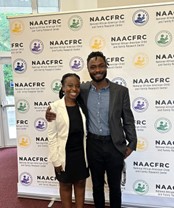Pathways to Equitable Programs and Policies
October 22, 2024
by

My name is Sando Zou-Capuzzi, and I am a young parent leader working with the Center for the Study of Social Policy (CSSP) for the last three years, to improve outcomes for young parents transitioning out of foster care with a particular focus on young fathers of color. I recently had the opportunity to present at the National African American Child and Family Research Center (NAACFRC) Community-Engaged Researc

h Conference, held in Atlanta, GA. The conference theme was Pathways to Equitable Programs and Policies. A staff member at CSSP, Fatima Kane, and I were invited to share our insights on the Parent Power panel. The purpose of this panel was to discuss the important role parents have in research and best practices for co-design.
 Co-design is the way we do our work at CSSP. I have seen the impact of our work and have been a part of exciting projects. During the panel, I touched on aspects of how we work together, which helped me share my voice and contribute to these projects. One of the big things that made a difference for me is being part of the thinking and designing of projects from beginning to implementation. Every year, the young parent leaders and the staff members create our scope of work together. The parent leaders identify what we want to work on and what is the most pressing issue for us and our peers. I not only brainstorm ideas but also execute ideas with the team. I am a part of the decision-making process. I really appreciate the space created for us to be honest when things are going well or if we have concerns along the way. There were a couple of projects where we started in one direction, and based on the young parent leaders’ feedback, we changed. I also value the focus on relationship-building, and having staff members who carve out time to get to know me and support me both in my professional and personal development. Staff members are available to help me deal with challenging situations and celebrate me and my accomplishments. I learned many new skills, such as designing and facilitating focus groups, meeting facilitation, writing for different audiences, analyzing qualitative data, and more. Another great aspect of how we work is the team of young parent leaders from different states, which gives me an opportunity to connect with peers, and network and truly makes the work fun!
Co-design is the way we do our work at CSSP. I have seen the impact of our work and have been a part of exciting projects. During the panel, I touched on aspects of how we work together, which helped me share my voice and contribute to these projects. One of the big things that made a difference for me is being part of the thinking and designing of projects from beginning to implementation. Every year, the young parent leaders and the staff members create our scope of work together. The parent leaders identify what we want to work on and what is the most pressing issue for us and our peers. I not only brainstorm ideas but also execute ideas with the team. I am a part of the decision-making process. I really appreciate the space created for us to be honest when things are going well or if we have concerns along the way. There were a couple of projects where we started in one direction, and based on the young parent leaders’ feedback, we changed. I also value the focus on relationship-building, and having staff members who carve out time to get to know me and support me both in my professional and personal development. Staff members are available to help me deal with challenging situations and celebrate me and my accomplishments. I learned many new skills, such as designing and facilitating focus groups, meeting facilitation, writing for different audiences, analyzing qualitative data, and more. Another great aspect of how we work is the team of young parent leaders from different states, which gives me an opportunity to connect with peers, and network and truly makes the work fun!
The general themes from other organizations that presented in the Parent Power Panel were the importance of family well-being, particularly the involvement of fathers, leveraging relationships in communities, and collaboration between staff and parents in Headstart programs. The audience members were curious to learn more about engaging fathers and young parents and bridging the generational gap when working with parent leaders of different ages. I was very excited to have many conference participants come up to me after the presentation to ask questions and share ideas for how to move the work forward. So many ideas were exchanged, and I can’t wait to begin exploring how to implement them.


